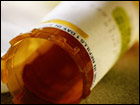|
Merck warns on 2002
|
 |
December 11, 2001: 5:17 p.m. ET
U.S. drugmaker expects 2002 profit per share flat vs. 2001.
|
NEW YORK (CNN/Money) - U.S. drugmaker Merck & Co. warned Tuesday earnings per share in 2002 would be much lower than current Wall Street expectations, calling the next four quarters "a transition year."
Merck CFO Judy C. Lewent said in a meeting with analysts the company anticipates earnings per share to be at the same level as 2001, for which Merck reaffirmed guidance of between $3.12 and $3.15 per share.
Analysts surveyed by First Call, on average, are currently expecting the company to earn $3.40 per share in 2002.
Shares of Merck (MRK: down $6.29 to $60.70, Research, Estimates), whose stock is among the 30 issues in the Dow Jones industrial average, fell more than 9 percent on the New York Stock Exchange.
The company said its bottom line will be hurt by lost revenue from patent expiration and an increase in research and development spending to bring new drugs to market.
Merck said the expiration on the patent of heartburn and ulcer drug Prilosec, the world's best-selling prescription drug, will "significantly dampen bottom-line growth in 2002."
To find much-needed replacements for expirees, Merck said it expects R&D spending to increase to $2.9 billion, up from the $2.5 billion in R&D outlays estimated for 2001.
"This 2002 guidance is not at the level that we would have liked to deliver," Lewent said. "As we complete this transition in 2002, we expect to deliver double-digit earnings-per-share growth in 2003."
Merck wants 11 approvals by 2006
Earlier in the day, the company said it is looking for the approval of 11 new medicines by 2006, including eight with the potential to be "breakthrough" treatments.
"Our goal is not to be just one of the largest pharmaceutical companies, but also to be one of the fastest growing," CEO Raymond Gilmartin told the meeting.
Analysts were already concerned about Merck's 2002 outlook and slowing sales of its blockbuster arthritis treatment, Vioxx.
Merck currently counts on five key drugs to drive sales and earnings, including cholesterol-fighter Zocor and asthma drug Singulair, which the company said it plans to seek approval for in treating seasonal allergies.
Company officials told analysts that clinical trials indicate Singulair reduces allergy symptoms as well as those of asthma. They said 60 million Americans suffer from seasonal allergies, 35 million of whom also suffer from asthma.
Cholesterol, HIV drugs planned
Merck officials said they expect U.S. regulators to accept a marketing application by the first quarter of 2002 for a novel cholesterol treatment called Zetia, also known by its chemical name ezetimibe.
The filing for Zetia, a drug discovered by Schering-Plough Corp. (SGP: up $0.36 to $38.65, Research, Estimates) and now being co-developed with Merck, is for using the medicine by itself or in combination with other "statin" cholesterol drugs like Zocor and Pfizer Inc.'s (PFE: down $0.99 to $40.35, Research, Estimates) popular Lipitor. Zetia lowers bad LDL cholesterol levels in the body by up to 18 percent by itself and boosts the effectiveness of other cholesterol drugs by the same factor.
Merck said the company would ask U.S. regulators by late 2003 to approve a pill containing Zetia and Zocor. Some analysts expect the product to generate U.S. sales of up to $6.5 billion within two years of launch -- in time to win over patients before Zocor's patent expires.
Analyst Richard Stover of Arnhold & S. Bleichroeder, who attended the meeting at Merck headquarters in Whitehouse Station, N.J., said, "The presentation on the cholesterol franchise was very powerful. The combination [Zetia-Zocor] therapy is a huge opportunity for Merck."
Stover said Merck's cholesterol drug sales could top $10 billion annually, up from about $7 billion now. But profits from the Zetia-Zocor combination would have to be shared with Schering-Plough.
Check out how drug stocks are doing here
Merck also said it plans human trials next year of a new treatment against the HIV virus that causes AIDS which could be a "breakthrough" drug. The company said the experimental drug works by blocking the integrase enzyme.
To be considered a "breakthrough" treatment, a drug must have the potential to be a significant medical advance over current therapies, including the ability to address unmet medical needs, Merck's Gilmartin said.
Merck added that it is conducting late-stage, or Phase III, trials of MK-869 -- a treatment for long-term depression that is also being studied to treat nausea in patients on chemotherapy.
In October, Merck met third-quarter earnings expectations and said it is comfortable with guidance for yearly earnings between $3.12 and $3.18 per share.
Safety tests planned for Vioxx
Merck said it plans to test Vioxx to determine if the medicine increases the risk of blood clots that can cause heart attacks and strokes, a concern that has crimped sales of the drug.
The company's research chief, Edward Scolnick, said Merck would perform similar cardiovascular-safety trials on Arcoxia, a Merck arthritis drug that is awaiting approval from U.S. regulators. 
-- from staff and wire reports
|
|
|
|
|
|

|

